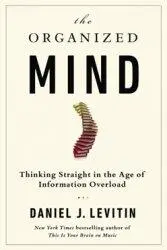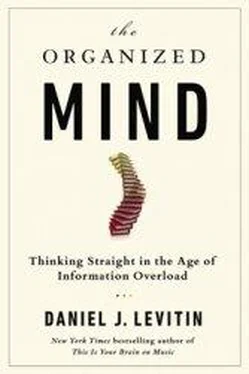The Organized Mind: Thinking Straight in the Age of Information Overload
What’s in it for me? Learn to organize your life!

The way our brain manages information often seems mysterious. Daniel Levitin lifts the veil and reveals the systems that are at work every time we drive a car, learn something new, or try to remember where we put something.
With a greater understanding of these processes, you’ll be better equipped to take charge in organizing your life. You’ll also discover how to apply simple techniques, learn the best way to remain productive at work and even how to cope with situations that are out of your control.
In the following blinks, you’ll also learn:
how the brain of a taxi driver looks different to your brain;
how to be more effective by working less; and why Google confronts potential employees with an unsolvable question.
The brain can only focus on a limited number of stimuli at a time.
Have you ever told yourself that you’d like to “get organized?” It’s an easy promise to make, but difficult to put into action. So where can you get started?
Well, before we even approach this challenge, we must first understand in greater detail the way our mind works, more specifically, our attentional system. This is the way our brain handles and categorizes information. The times we live in pose a great challenge to this system, because our brains aren’t equipped to cope with the flood of new facts and sights that we face everyday. Instead, brains work best when concentrating on one thing at a time.
This was vital for our ancestors, who hunted successfully by staying highly focused. Their thoughts would only be disrupted by important events, such as an approaching predator.
Nowadays, we’re constantly attempting to do many things at once. Driving a car, listening to the radio, thinking about an upcoming business meeting – it’s not unusual that all these things happen simultaneously. This is something that our brain has not evolved to do successfully, which means that multitasking comes at a price.
When we switch our attention between different activities, our brain is unable to function effectively. This in turn causes us to make thoughtless mistakes, or forget and misplace things.
In order to better understand our attentional system, we also need to consider how our brain decides how to divide its attention. It’s all to do with the brain’s remarkable ability to detect changes.
Our brains are more likely to pay attention to changes than constants. For example, imagine you’re driving your car. You suddenly notice that the road feels bumpy. Prior to this, you didn’t even consider how even the street was, simply because this was not useful information.
But that realization could be vital, because it alerts you to a treacherous change in surface or a problem with your car.
Changing circumstances can pose a threat to our survival.
Because we’re surrounded by more and more information, we’re forced to make more and more decisions.
Decisions are part of everyday life: Should we opt for the cheaper internet plan, or pay more and get unlimited data? Should we respond to this email now, or read these texts first? We confront decisions like these nearly every minute. But how can our brain cope with this non-stop flow of decisions when it originally evolved to process one idea at a time?
It’s simple: We can manage the flood of information by focusing our attention. But how, exactly?
As we learned in the previous blink, our brain instinctively concentrates on the information that is most important for us.
Here’s an example: Imagine you’re on a busy street, desperately looking for your lost dog. You automatically fade out all unnecessary details like the people, cars and buses, and only focus on things that are the same size and color as your dog. So unless there are a lot of other things on this street that are about knee-height, fluffy and brown, your brain immediately makes it easier to find your beloved pet.
This automatic process of honing our focus down to what’s necessary should also be reflected in our decision making. In other words, you shouldn’t spend too much time on less important everyday choices. Instead, find shortcuts and ways to simplify your decision making.
For example, one type of decision we often need to make is about purchasing products or services that can make our lives easier. A good way to analyze these decisions is by thinking about the monetary value of our own time, because it allows us to compare it to the benefit the product promises.
Let’s say you’re thinking about hiring someone to clean your home instead of doing it yourself. Just ask yourself: would you be willing to pay $50 for two extra hours of free time? If the answer is yes, then go for it without deliberating any further!
Now that we’ve learned how to streamline our decision making, the following blinks will consider how to organize more aspects of our lives in the most effective way.
Find a designated place for every single object.
When was the last time you lost your keys, phone or glasses? It seems ridiculous that the objects we need with us all the time are also the ones that seem to go wandering most often. The reason is straightforward: We lose these objects because we carry them around with us. Objects that we only use in one place, like our toothbrush, seldom get lost at all.
There is, in fact, a special part of our brain dedicated specifically to remembering the location of things. It’s called the hippocampus, and it was crucial for our ancestors who needed to know where a watering hole was, or the areas where predators might pounce.
In order to learn more about our hippocampi, researchers studied the brains of London taxi drivers, as they are required to commit the city’s street plan to memory. The tests revealed that the hippocampi of the drivers were larger than average, meaning they are better able to recall the locations of certain streets, for example.
However, the hippocampus can only provide us with information about objects whose location doesn’t change. This isn’t a problem for a taxi driver trying to remember how to get to a particular building, but a constant problem for us when we try to remember where our frustratingly mobile keys are.
To ensure that you don’t always have to seek out these essential items, simply find a designated place for them. A special bowl next to the door for your keys always does the trick!
If you can’t set aside a certain place for an object, then it may also help to purchase duplicates. For example, if you need reading glasses, having a single location for them might prove frustrating as you may need them in different places. Instead, you could purchase a pair for your bedroom for nighttime reading, while another pair remains at work.
Give your brain a break – move your organizational processes outside your head.
Do you ever feel overwhelmed by all the different ideas and thoughts floating around inside your head? The best way to ensure you can keep track of them is to organize them outside your head.
A time-tested trick to unburden your brain is to write things down. Good old-fashioned flash cards are an easy and effective way to record and organize ideas as soon as you think of them.
For example, you might be on the bus and suddenly remember that you still have to buy a birthday present for your aunt. Don’t stress, just write it down and you’ll no longer have the burden of trying to remember it all day!
Читать дальше













